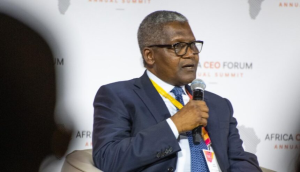
The Federal Government has unveiled plans to cut the cost of doing business at Nigeria’s ports by at least 25% through the implementation of the National Single Window (NSW) system.
Minister of Marine and Blue Economy, Adegboyega Oyetola, disclosed this at a stakeholders’ forum in Lagos on Tuesday, emphasizing that the initiative aims to streamline port operations, enhance efficiency, and minimize delays.
Oyetola noted that the high cost of doing business at Nigerian ports—estimated to be up to 40% higher than in other West African countries—results in an annual revenue loss of approximately ₦2.5 trillion. He stressed that implementing the NSW system would improve transparency and strengthen trade facilitation.
“In addition to reducing costs, the system will enhance logistics and improve Nigeria’s overall ease of doing business,” Oyetola said.
The minister highlighted the government’s commitment to multimodal connectivity, stating that efforts are underway to integrate road, rail, and inland waterways into port operations to further reduce transportation costs. He pointed to the recent clearance of the long-standing Apapa-Tincan-Mile 2 traffic congestion as part of these efforts.
Oyetola also revealed that the turnaround time for vessels had dropped from an average of seven days to five, while truck turnaround time had been significantly reduced from ten days to just a few hours.
As part of port modernization efforts, he announced that the Apapa and Tin Can Island ports would serve as pilot projects for revamping existing port infrastructure, with private sector participation encouraged for further expansion.
Additionally, the Nigerian Ports Authority (NPA) has acquired two state-of-the-art tugboats to enhance operational efficiency, with more marine crafts set to be procured.
Speaking on the broader maritime sector, Oyetola emphasized Nigeria’s potential to become a leading player in the blue economy, given its vast coastline and maritime resources. He said that establishing a National Flag Carrier through a Public-Private Partnership (PPP) was under consideration to boost employment and government revenue.
Meanwhile, the Managing Director of the Nigerian Ports Authority, Dr. Abubakar Dantsoho, reaffirmed the agency’s commitment to the NSW project. He described it as a globally recognized trade facilitation tool that would integrate stakeholders such as importers, exporters, customs, banks, and relevant government agencies into a single digital platform.
Dantsoho also noted that the NPA was aligning its operations with the NSW framework to enhance transparency and position Nigeria as a major transshipment hub in West Africa.
He acknowledged the existing infrastructure challenges but assured stakeholders that ongoing port modernization projects would bridge the gap and boost Nigeria’s competitiveness in global trade.
The NSW system, once fully operational, is expected to simplify trade processes, eliminate redundancies, and significantly improve efficiency across Nigeria’s maritime sector.








